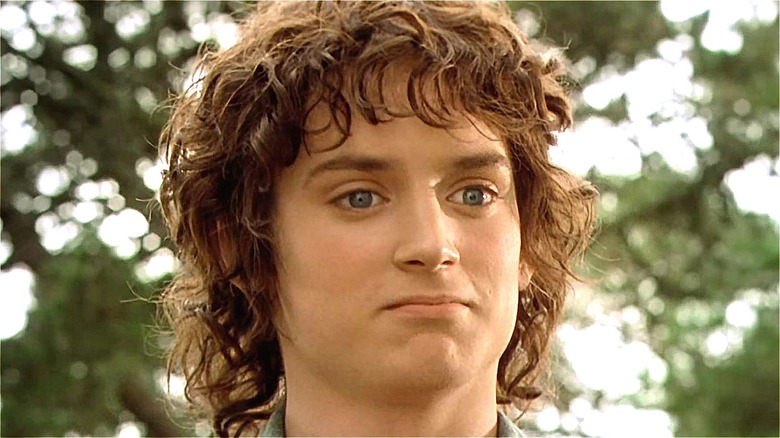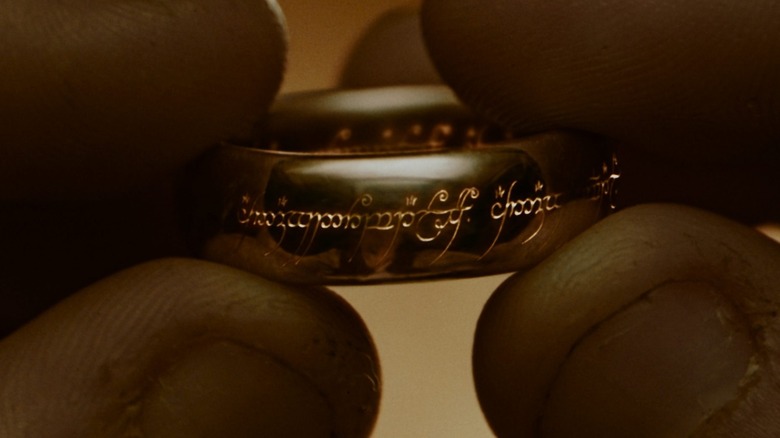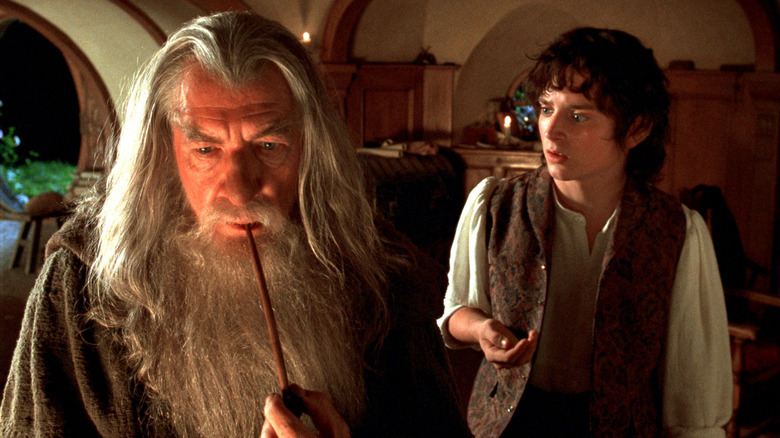How The First Episode Of The Rings Of Power Connects To The Fellowship Of The Ring
After years of minimal information, Amazon has officially cranked the promotion of its "Lord of the Rings: The Rings of Power" series up to 11. In a matter of weeks, we've seen a splendiferous title reveal, the dramatic delivery of 23 mysterious character posters, and now a massive behind-the-scenes information dump (of both the picture and text variety) thanks to a special feature from Vanity Fair. While the previous unveilings were fun, the Vanity Fair piece was particularly revealing: It connected characters with actors, elaborated on storylines, and even dove into a lot of "behind the camera" elements that the writers and directors have had to struggle with when it comes to adapting something this massive.
We also received an insightful bit of information from director J.A. Bayona, who helped to set the tone by directing the first two episodes of the series. As he reminisces on his own experiences growing up in a Spain that was still recovering from the ravages of war, the filmmaker says, "We had a dictatorship for 40 years, so you notice the repercussions of war and the shadow of the past." After this, Bayona notes that "The Shadow of the Past" is also the name of the first episode.
It turns out that the title of the first episode is actually much more important than it looks on the surface. At first glance, it seems likely that the initial installment will be dealing with the fallout of the destruction of the original Dark Lord Morgoth at the end of the First Age. However, the wording of the title also seems to deliberately point to something from "The Lord of the Rings" — a part of the story that takes place much later, all the way at the end of the Third Age.
How The Rings of Power is already connecting to the LOTR narrative
From the moment it was announced that Amazon would be pursuing a show set in the Second Age, fans have been speculating about how difficult it will be to connect it to "The Lord of the Rings" narrative. After all, the entire 3000-year-long Third Age lies between the two stories. Nevertheless, the show has already found small-yet-important ways to connect its own iteration of Middle-earth to both "The Lord of the Rings" books and movies that have come before. For instance, Elrond, Galadriel, and Sauron are in the show — albeit in much less mature forms. We'll also be revisiting Moria, although again, this will happen much earlier, when it's still a thriving Dwarven kingdom.
It also turns out that the title of the first episode of the show offers yet another small way that the new content can connect to the old, this time in the beginning of "The Fellowship of the Ring." After Frodo inherits Bilbo's Ring as the story kicks off, Gandalf pays him a visit and reveals that his small ring is, in fact, the One Ring to rule them all. This conversation takes place in Bag End, and it sparks the beginning of Frodo and Sam's flight from the Shire toward Rivendell.
In the book, "The Fellowship of the Ring," this event takes place in the second chapter, a chapter titled ... drum roll, please... "The Shadow of the Past." That's right. The first episode of "The Rings of Power" has the same title as the second chapter of "The Fellowship of the Ring," and it seems that both of them will play the critical role of setting the stage for the story that follows.
The crucial chapter
This title, "The Shadow of the Past," makes for a fun connecting point between the upcoming show and the existing source material. However, the choice to pick that chapter, in particular, comes with some extra weight — backed by none other than Tolkien himself.
In the foreword to "The Fellowship of the Ring," Tolkien describes "The Shadow of the Past" as "The crucial chapter" of the story that connects it to "The Hobbit" and his larger world. He adds that it "is one of the oldest parts of the tale." And, indeed, that chapter is a critical launching point to the entire epic saga that follows. Up until that point, readers had experienced the lighthearted content of "The Hobbit," as well as Bilbo's silly 111th birthday party. It's only when we get to the second chapter of the "The Fellowship of the Ring" that the far more serious nature of "The Lord of the Rings" starts to emerge.
The chapter covers everything from the history of the Rings of Power to the re-emergence of the Ringwraiths, to Sméagol's evolution into Gollum, to Frodo's reluctant willingness to take on the quest. We even see Sam literally get dragged into the scene as the chapter ends. Tolkien described the inspiration for the chapter by saying that "Its sources are things long before in mind, or in some cases already written..."
In other words, this was the crucial chapter that brought his larger world into the small, comfortable world of "The Hobbit," and changed it for the better in the process. Here's hoping Amazon can do the same with its show. So far, only one thing is certain — launching the series with an episode titled "The Shadow of the Past" is a good start.


